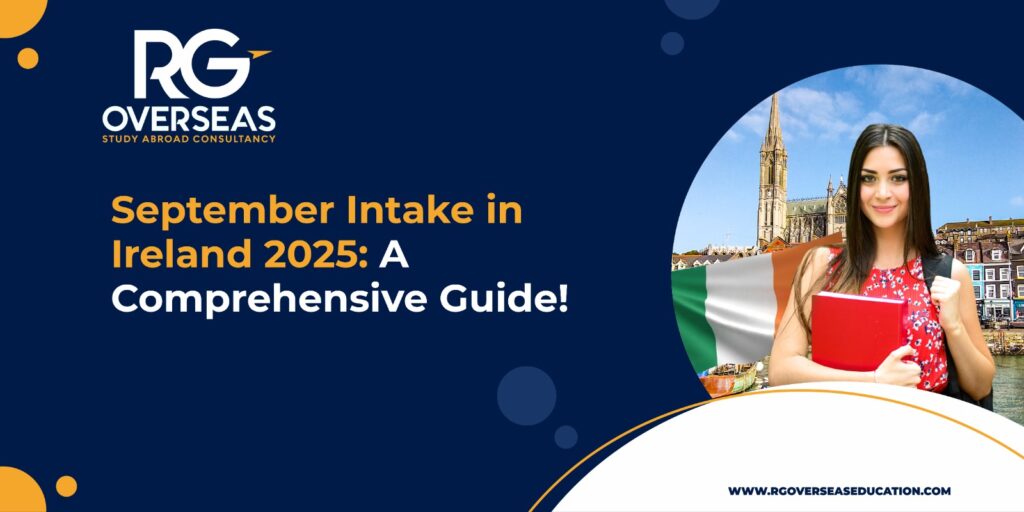
Studying in Ireland has become an increasingly popular choice for international students. Its reputation for world-class education, vibrant culture, and welcoming communities makes it a top destination. If you’re considering applying for the September Intake in Ireland 2025, this comprehensive guide will walk you through everything you need to know to make informed decisions and secure your place.
Why Choose Ireland for Higher Education?
Ireland stands out for its mix of academic excellence and cultural richness. Here’s why students worldwide are drawn to it:
- Globally Recognized Universities: Ireland boasts top-tier institutions like Trinity College Dublin, University College Dublin, and National University of Ireland Galway. Their degrees are respected worldwide.
- Diverse Course Options: From technology and business to arts and healthcare, there’s something for everyone.
- Post-Study Work Opportunities: The Irish government offers a stay-back option for graduates, allowing you to work and gain experience after completing your degree.
- Safe and Friendly Environment: Known for its hospitality, Ireland is one of the safest countries for international students.
- Cultural and Historical Richness: You’ll be studying in a country steeped in history, with countless opportunities for exploration.
Key Highlights of the September Intake in Ireland
The September intake, also known as the Fall intake, is the most significant academic intake in Ireland. Here’s why it’s popular:
- Wide Availability of Programs: Almost all courses, including undergraduate and postgraduate programs, are open during this period.
- Scholarship Opportunities: Many universities offer scholarships specifically for the September intake.
- Networking Events: This intake aligns with major academic and professional events, giving you more opportunities to build connections.
Application Timeline for September Intake 2025
Planning is critical to ensuring a smooth application process. Here’s a breakdown of the timeline:
- October 2024 – January 2025: Research and Shortlist
- Identify universities and programs that suit your interests.
- Check entry requirements for your chosen courses.
- February – April 2025: Prepare and Apply
- Start gathering documents such as academic transcripts, letters of recommendation, and English proficiency scores (IELTS/TOEFL).
- Submit applications early to maximize your chances.
- May – June 2025: Acceptance and Funding
- Await offer letters and accept a suitable one.
- Begin exploring scholarships or arrange funding.
- July – August 2025: Final Preparations
- Apply for your visa (at least two months before departure).
- Arrange accommodation and book flights.
- September 2025: Start Your Journey
- Land in Ireland and attend orientation programs to kickstart your academic life.
Eligibility Criteria for Admission
While requirements may vary depending on the university and course, these are the general criteria:
For Undergraduate Programs:
- Completion of secondary education equivalent to the Irish Leaving Certificate.
- Minimum academic percentage (usually 60–70%).
- Proof of English proficiency (IELTS: 6.0+ or TOEFL: 80+).
For Postgraduate Programs:
- A relevant undergraduate degree with a minimum GPA (often 2.5+ on a 4.0 scale).
- Work experience for certain programs (like MBAs).
- English proficiency scores.
Required Documents for Applications
Ensure you have these documents ready to streamline the process:
- Academic transcripts and certificates.
- Statement of Purpose (SOP) detailing your goals and reasons for choosing Ireland.
- Two or more Letters of Recommendation (LORs).
- Proof of English language proficiency.
- Updated CV/Resume.
- Passport copy.
- Portfolio (if applicable for creative courses).
Popular Courses in the September Intake
Ireland is known for its focus on technology, innovation, and creativity. Here are some sought-after courses:
- Computer Science and IT: Programs in Artificial Intelligence, Data Analytics, and Cybersecurity.
- Business and Management: MBAs and MSc programs in International Business or Marketing.
- Healthcare and Pharmaceuticals: Nursing, Biotechnology, and Biomedical Science courses.
- Engineering: Civil, Mechanical, and Software Engineering programs.
- Arts and Humanities: Literature, Creative Writing, and Media Studies.
Top Universities for September Intake 2025
- Trinity College Dublin (TCD):
Renowned for research-driven education and a diverse range of programs. - University College Dublin (UCD):
Offers a strong global alumni network and excellent postgraduate programs. - National University of Ireland Galway (NUIG):
Known for its focus on healthcare and technology courses. - Dublin City University (DCU):
Perfect for those pursuing business and communication studies. - University of Limerick (UL):
Famous for cooperative education and engineering programs.
Scholarships for International Students
Scholarships can ease financial stress and open more opportunities. Here are some options:
- Government of Ireland Scholarships: Fully funded scholarships for outstanding international students.
- University-Specific Scholarships: Most institutions offer merit-based or need-based scholarships.
- External Funding: Organizations like Chevening provide financial aid for eligible students.
Cost of Living in Ireland
Studying in Ireland requires budgeting for tuition fees and living expenses. Here’s an overview:
- Tuition Fees: €9,000–€25,000 per year (varies by program).
- Accommodation: €600–€1,200 per month (shared or private housing).
- Other Expenses: Food, transport, and personal costs average €600–€1,000 monthly.
Student Visa Application Process
Applying for a student visa is a crucial step. Follow these steps:
- Complete the Online Application: Submit your application through the Irish Naturalization and Immigration Service (INIS) website.
- Gather Supporting Documents: These include your offer letter, proof of financial support, passport, and health insurance.
- Attend the Visa Appointment: Submit biometrics and attend the interview (if required).
- Wait for Approval: Visa processing typically takes 4–8 weeks.
Tips for a Successful September Intake Journey
- Start Early: Delays can lead to missed opportunities. Begin your applications ahead of deadlines.
- Seek Expert Advice: Consult educational consultants or career advisors.
- Engage with Alumni: Their experiences can provide valuable insights.
- Stay Organized: Keep track of deadlines and document requirements.
Life as a Student in Ireland
Ireland offers an incredible student experience with its blend of academics and vibrant cultural life:
- Cultural Diversity: You’ll meet people from all over the world, enhancing your global perspective.
- Work Opportunities: Part-time jobs (20 hours/week during term time) can help cover expenses.
- Exploration Opportunities: From the Cliffs of Moher to Dublin’s bustling streets, there’s much to see.
Conclusion
The September Intake in Ireland 2025 presents a golden opportunity for students aiming to combine quality education with unforgettable life experiences. From globally renowned universities to enriching cultural exposure, Ireland offers everything to set you up for success. Start planning early, ensure you meet deadlines, and take full advantage of the resources available.


